
Theology of Star Wars
Register Articles Joseph Campbell Search

The dawning of the prequel, "Star Wars: Episode I -- The Phantom Menace," generated a scrutiny of everything linked to George Lucas' creation -- the lines that formed in front of Los Angeles theaters six weeks before the opening, developments in artificial intelligence research, movie memorabilia and God.
The last issue isn't the stretch it may seem. Though Lucas, in a Time magazine interview, backed away from assertions his movies are "profoundly religious," he admitted to using the Force as a representation of God and Dark Side warrior Darth Vader as a metaphor for the evil that exists, hopefully dormant, inside all humans.
With recurring themes of good versus evil, redemption and the power of faith, the movies are at the very least the embryo of a theological and philosophical forum that may lack light sabers, but is as spirited as the duels between light and dark.
And the discussion is not limited to the zealots who attend "Star Wars" conventions. Jonathan Young, a psychologist and mythologist who founded the Joseph Campbell Archives in Carpinteria, recently lectured about "Star Wars" at Harvard University.

Campbell, the late mythologist, is credited as Lucas' influence in his "Star Wars" movies. Young perceives the film series as a treasure chest brimming with principles that can be applied to everyday life.
The films offer illustrations of the temptation to take shortcuts seemingly leading to power, Young said. The moral is finding the discipline to resist false riches and stay on the path of truth and purpose.

Religious symbols are nearly as numerous in Lucas' tales as aliens. Darth Maul, the red-faced, horned dark lord in the new movie, seems to be the devil. Obi-Wan and the wizened, professorial Yoda develop an almost angelic presence. When Obi-Wan counsels his young student to feel the Force, the scenes could be set in a church.
"We have the Force within us just like theologians say we have the Holy Spirit," Young said. "The Force is the most noble qualities a culture has to offer. It is whatever divine inspiration the religions point to."
People scoff at "Star Wars" as philosophy for the same reasons they downplay the significance of dreams, according to Dennis Slattery, professor of psychology and mythology at Pacifica Graduate Institute in Carpinteria.
They distrust concepts that aren't embraced by society's leaders and can't be quantified through science or history.
But Slattery sees Lucas' stories as an aperture that reveals a new perspective of the universe. Like Bible parables, the films offer explanations of vice and virtue.
And the big screen medium does not faze him.
"I think people going to the dark theater is a ritual very much like going to church on Sunday morning," Slattery said. "It's kind of like the religious worship of the psyche."